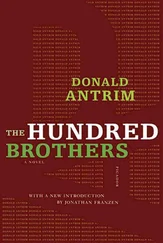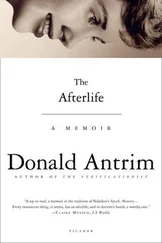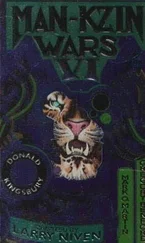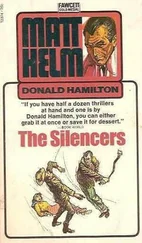All this time, Bernhardt was holding me, not merely physically, but, more to the point — and in the deep sense made famous by the British Object Relations theorists — emotionally. And yet it was difficult to stay relaxed, everything considered.
Sherwin’s hips moved at a pace too rapid for me or Rebecca or Bernhardt to follow or imitate in our breathing; there was nothing for us to do but hang in one another’s arms and sweat beneath the skillets. Sherwin, between drunken thrusts, managed to say, “Excellent”—deep, long thrust—“party”—once again moving into Leslie—“Thomas.”
It was at this point that a strange and unaccountable thing happened. A car drove up and stopped outside the Pancake House. I could not see it, because it parked directly out front behind a small, decorative wall. However, I could hear tires crunching the gravel, and I could make out a rattling sound, the motor dying. I could hear, quite clearly, the car door opening, maybe the driver’s-side door, maybe the passenger’s; and, following this, the expectable metal-and-rubber thud, the door closing. I know by heart these noises made by my own car’s out-of-tune engine, its doors unlatching before slamming not so solidly shut; and I thought that this might be— at last! — our little green sedan driven by Jane to pick me up.
But it was a man, and not my wife, who walked into the restaurant and stood in the doorway looking around the place.
He was dressed in a dark woolen jacket over a white shirt and black or, perhaps, gray or navy trousers. He wore wire-rimmed glasses and had a smallish nose and a beard trimmed short, and he was, as were so many men gathered that night, nearly bald. What hair he had left was clipped on the top and sides, barbered to match the beard. He was noticeably tall and his ears stood out almost as prominently as Elizabeth Cole’s. The man was, by his looks, neither a long-distance traveler nor an insomniac; he appeared, at any rate in my impromptu fantasy about him, as if he had been somewhere in the country for an important dinner that had gone late. He took one look at the scene inside the Pancake House, then turned and walked out.
Here’s the strange thing. The man looked like me. He didn’t look exactly like me, but he looked something like me — like a happier, better-dressed and better-groomed, entirely better-looking and better-fed, more handsome and successful adaptation of me. That is why I recall him, and why I remember the feelings of shame that came over me when I saw that this was not Jane coming in the door to fetch me home; rather it was a man in a well-cut coat who sauntered in and, I suppose, took in, at a glance, as it were, everything required for him to comprehend the situation — the boy and his girlfriend stealing the beer, and Mike and Elizabeth staring into one another’s eyes, and the pathetic dancing at the middle of the room. He saw Leslie fucking Sherwin while the rest of us pretended to look away. He saw me being raped.
What must he have thought? He left the restaurant. He’d seen as much as he needed or wanted to see. What future use might he make of it? Light flooded the doorway as he held the door open. He went through into the light. The door closed behind the man, and a moment later the car door opened and closed, and the ignition started the motor, and the car drove away. Possibly someone was with the man in the car. Possibly kids were sleeping in the backseat. Who knows? The car drove away, but the light outside did not diminish. It came in the windows of the Pancake House & Bar. The light was not sunlight, nor was it the light shining from the man’s car’s headlamps. The light came in the windows, the curtained and uncurtained windows, from east and west and south and north.
Staring into the light, into that glow, I knew — or felt I knew, which in retrospect may be the same or as good; and who can with certainty know what anyone’s future will bring? — that my legs were truly dead, and that I would probably never have a son with Jane, and that my own father had, with my complicity, taken my life from me.
My clothes were soaked with sweat and Bernhardt’s semen. I felt ashamed, and I was shivering. Was I crying? I think I was. Yes. Bernhardt rocked me in his arms.
“Easy does it,” he said to me.
“I don’t feel well,” I said to him.
“You’re going to be all right, Lieutenant,” he said to me.
“Something’s not right with me,” I said to him.
“You’re a good man,” he said to me.
“Everything hurts,” I said to him.
“I’ve got you, Tom,” he said to me.
“I can’t move,” I said to him.
“Don’t try to move,” he said to me.
“I want to see Jane,” I said, sniffling.
“Jane loves you,” he said to me.
“I need to go to the hospital,” I said.
“Sshhh.”
“Will you take me to the hospital?” I begged my father.
“I will.”
“Do you promise?” I asked.
“I promise.”
And with that he lifted me up and tossed me in the air, he threw me into the air and, throwing me, let me go. His arms released me, and I released Rebecca’s hand, and I was free.
“Goodbye, Tom,” said the girl with the dog on her neck, as I flew above the aquarium and the tables and chairs.
“Goodbye, Rebecca,” I said to this girl whose father I had probably — no, certainly — stabbed.
“So long, Tom,” said Bernhardt, his load lightened, his arms empty of their night’s burden.
“Goodbye,” I called to him.
“We’ll be seeing you later, Tom!” called another voice. This sounded an awful lot like Peter Konwicki — the old adversary transformed, after a night out, into my pal. Or was it Sherwin making a hoarse, fatigued, postcoital adieu? These were my friends saying sad farewells at the end of our supper.
“Feel better!” they all called to me from below.
“Goodbye,” I cried back at them. “Goodbye.”
I was sorry that Dan was not out of the men’s room. What was the problem? Had he accidentally locked himself in? I would have liked to say goodbye to Dan.
“Goodbye,” waved Bernhardt and Maria and Manuel. They’d been my booth mates.
“Goodbye!”
“So long!”
“Farewell.”
“A bientôt!”
“Goodbye,” one last time. “Goodbye.”
And this time, when I passed through the roof, I really and truly passed through the roof. It was easy. It happened just like that. I did not, as I knew I would not, feel a thing.
The air was freezing cold outside. Light from above spilled everywhere. We were going to have a frost for sure. What had happened to spring? What would become of Jane’s tulips blooming beside our driveway?
I could see the Pancake House roof with its neon sign rigged over the entryway. I heard the thunder from over the river. I saw the parking lot with its towering trees surrounding everyone’s cars, the poplars throwing long shadows across the neighboring fields, all the trees and the bushes beneath the trees like a lit-up and windblown train-set forest seen from on high; and I could see, off in the distance, the broken airport.
What about that light cascading down to make the stormy night into day? Need I say that it came from the hospital? It came from the hospital. The hospital had come for me. It was my beacon and my home. It shielded me from the rain. It waited above me.
Before I got inside the hospital, I looked toward the north. I searched this direction and that across the nighttime horizon, to see if I might chance to make out, through the light and the mist and, beyond the awful light, against the outer darkness, any cars on Eureka. And, you know, I did locate, through one brief, tiny opening in the clouds, a small automobile creeping up the steep hill that rises to a flat peak before plummeting like a roller-coaster ride past the book factory, into the covered bridge.
Читать дальше












